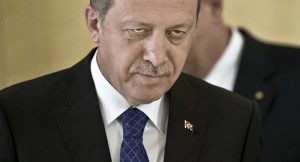In 2010, Bernard Lewis predicted that Iran and Turkey would trade places by the end of the decade. Iranians would abandon political Islam for secular nationalism, the great Princeton Orientalist said, even as the Turks relinquish their secular, Western-looking republic for some form of Islamist rule.
Today the Iranian transformation is at an embryonic stage. But the Turkish one is well under way, and liberal and secular-minded Turks are mostly powerless to stop it.
Turkish strongman Recep Tayyip Erdogan on Sunday asked voters to ratify his authoritarian ambitions and his existing gains from a power grab going back to 2008. A majority agreed, though the margin was thin given what observers with the Organization for Security and Cooperation in Europe and the Council of Europe delicately described as an “unlevel playing field” that tilted in Mr. Erdogan’s favor.
Fifty-one percent is a lame prize indeed for a purged bureaucracy, a muzzled press and a jailed opposition. Add an election-day switcheroo on the rules governing ballot verification, which the opposition Republican People’s Party (CHP) says may have affected as many as 2.5 million votes, and the legitimacy of the plebiscite is in jeopardy. There would be a redo—if Mr. Erdogan weren’t the type of man who grows more shameless when shamed.
The CHP has vowed to mount a legal challenge, but the party faces long odds against once-independent institutions now packed with Erdogan loyalists. The likely outcome is that the result will stand, marking a major milestone on Turkey’s path to Iranization.
Yes, you can still legally drink alcohol in Turkey, the hijab isn’t mandatory for women and you can still access this newspaper’s website on the Turkish internet. Let’s hope Turkey’s secular forces can defend their liberties against encroachments by Mr. Erdogan and his Islamist Justice and Development Party (AKP). But restrictions on personal freedom aren’t the only mark of ideological dictatorships like Iran’s, and Ankara’s behavior of late bears many of the other indicia.
An important one is the application of authoritarian methods far outside their borders, against their own subjects abroad as well as citizens of free societies. The Ayatollah Khomeini’s 1989 fatwa against the British novelist Salman Rushdie was the classic case, and Mr. Erdogan is increasingly pursuing similar vendettas against his Western critics and enemies (real and perceived).
Over the referendum weekend, following a complaint by a group of Turkish lawyers, the Istanbul prosecutor’s office announced an investigation into 17 U.S.-based individuals the lawyers say are allies of Fetullah Gülen, the exiled Islamist imam and erstwhile AKP handmaiden. Ankara accuses Mr. Gülen of masterminding an attempted coup in July.
Among these alleged Gülen allies are Senate Minority Leader Chuck Schumer, former CIA director John Brennan and Preet Bharara, the former top federal prosecutor in the Southern District of New York.
Then there is Michael Rubin, an analyst with the right-leaning American Enterprise Institute and a contributor to these pages. A tough critic of Mr. Erdogan, Mr. Rubin has argued—correctly—that the AKP’s authoritarian drive risks destabilizing the country. Mr. Rubin also predicted the July putsch. The notion that he’s a crypto-Gülenist would be laughable but for the fact that it reveals the depth of paranoia within AKP circles.
“I’ve been a critic of Gülen when he worked hand in glove with Erdogan,” Mr. Rubin said in a phone interview Tuesday. Turkish propagandists, the Washington-based analyst says, accuse him of “Islamophobia” even as they also claim that he colludes with an Islamist cleric.
The aim of such legal and media harassment is to deter Mr. Rubin from visiting Turkey and to chill anti-Erdogan speech in the West. Ankara also probably hopes Turkish insiders and dissidents will stop feeding Mr. Rubin information.
The “investigation” is of a piece with Ankara’s attempt last year to have a German comedian prosecuted—in Germany—for delivering an obscene satirical poem about Mr. Erdogan on television. A spokesman for the Turkish presidency didn’t respond to a request for comment.
“Erdogan has eviscerated the press inside Turkey but it frustrates him that he can’t control people outside,” Mr. Rubin says. Mr. Erdogan imagines that democratic leaders such as President Trump and Germany’s Chancellor Angela Merkel wield as much power in the U.S. and Germany, respectively, as he does in Turkey. He expects Mr. Trump and Mrs. Merkel to silence writers such as Mr. Rubin as a matter of diplomatic courtesy.
Western leaders should correct the Turk’s misapprehension. The domestic opposition is cornered, but the referendum showed that half or more of Turkish society will never accept Mr. Erdogan as an elected sultan. Turkey is still linked to NATO and the West in a way that Iran never was. That’s all the more reason for Turkey’s Western allies to speak up for Mr. Erdogan’s victims and help arrest, if not reverse, Turkey’s transformation into another closed society like the one next door.
Ask me anything
Explore related questions





